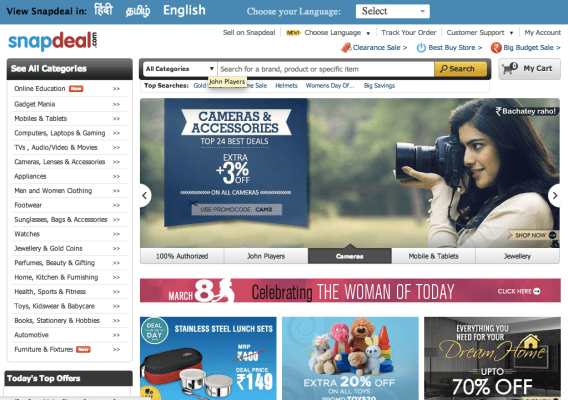On the heels of Flipkart raising an eye-popping $1 billion, here’s one more sign of the landgrab going on in the Indian e-commerce market today. Its rival Snapdeal has raised yet more outside investment, for the third time this year, this time from Ratan Tata, the chairman emeritus of Indian conglomerate Tata Group.
The amount is undisclosed but we are trying to find out (and will update if/when we do). In this year alone, not counting today’s investment, Snapdeal had already raised over $233 million, including $100 million in May from Blackrock and others; and $133.7 million from a group that included eBay.
In the meantime, Snapdeal CEO Kunal Bahl has confirmed the deal to us directly: “Mr. Ratan Tata, Chairman Emeritus, Tata, who is probably the most respected business leader in India, has invested in Snapdeal,” he wrote in an email, elaborating a bit further in a separate, canned statement that’s been quoted widely in the Indian press: “An investment by a legendary and respected figure like Mr. Tata is an excellent validation of our focused strategy on building a long term enterprise and marks the start of a very important phase for the company, ” he said (via Economic Times).
Although this is an investment by Mr Tata, not Tata Group, news of it comes a day after Snapdeal announced an agreement with Tata Value Homes, one of the many subsidiaries that form the Tata empire. Tata Value Homes, which builds affordable housing, will be selling a portion of its inventory through Snapdeal, starting at the end of this month.
That deal initially will cover 1,000 properties in urban centers like Mumbai, Pune, Ahmedabad, Bangalore and Chennai, with home prices ranging from 18-70 lakh ($30,000-$116,000). The model of selling homes online — not just advertising them for offline sales — is one that has also picked up some traction in Silicon Valley, with investor and former Square COO Keith Rabois currently building Homerun.
“It is a big first out here and sets the stage for e-commerce in India participating in lives of consumers in ways that include many things beyond physical products as well,” Bahl tells us.
Four year-old Snapdeal, which has 20 million registered users and about 4 million products in its inventory running the gamut from houses to hosiery to books about both, passed the $1 billion mark in sales after 2.5 years, Bahl tells us. Although the company is now raising a lot of money, it wasn’t always that way.
“We got there investing less than $100mn, which is one-third the time and one-third the capital of another market player with one-tenth the team size,” he says, making an unnamed reference to its big rival Flipkart. “It demonstrates how being the ‘Alibaba equivalent of India,’ by being focused on building a platform for 50,000+ small businesses and brands in India with zero inventory to sell to 25 million users in 5000+ towns and cities, we have been able to build India’s largest B2C marketplace, cost and time efficiently.”
The $1 billion figure is a tipping point that Bahl in the past has said would be the moment when he would start considering an IPO for the company.
The economies of scale in e-commerce certainly seem to point either to that route, or to massive consolidation — witness Flipkart’s acquisition of buying fashion site Myntra for $300 million earlier this year as one example of the latter, and Rocket Internet of the former. Sometimes termed a “clone factory” that simply builds companies to flip them to the originator, Rocket Internet is now increasingly looking like it will keep its holdings together and go for an IPO itself. Pressures like this, plus the small matter of having Amazon in its backyard, will be driving a lot of Snapdeal’s business moves.
Without any news of where Snapdeal may be sitting in terms of the public markets, it’s aggressively expanding in the meantime, to catch the growing wave of hundreds of millions of middle-class people in its home country who are going online more using cheap smartphones and low-cost bandwidth to buy goods and services.
Further afield, Snapdeal is also looking to grow, but in a different way. Bahl regularly visits the West Coast of the U.S. and has been, in the words of one person, “raiding” Silicon Valley and Seattle for engineers. The company currently has 1,300 employees and a remit to double that by year-end, adding some 250 engineers. That may even mean bolt-on acquisitions, too — likely to expand the company’s core technology rather than direct rivals to consolidate users, from what we understand.
